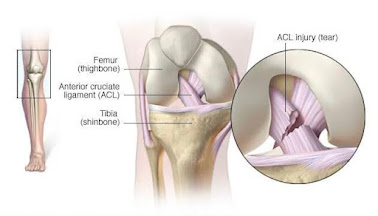KNEE ACL INJURY- Rehab Spine Physiotherapy Clinic in Lucknow
ACL injury is a sprain or tear of the anterior cruciate ligament. It is a common knee injury among athletes participating in high-demand sports such as basketball, football, and soccer. Because the tear will not heal on its own, it usually requires surgery.
ACL reconstruction rehab is not a quick process. In most cases, it can take up to 6 months of physical therapy to strengthen the muscles around the knee and regain full function. For the best possible recovery, you need to follow your doctor’s and physiotherapist’s orders.
If you are getting ACL surgery soon, below is a general idea of what to expect post-op.
Rehab spine Physiotherapy clinic Lucknow follows this protocol, or something similar, for a successful recovery:
Day 1-7
Following discharge from the hospital, it is crucial to control the swelling. Do not sit for long periods of time with your foot in a dangling position. This will increase swelling of the knee and leg. Rest with the affected leg elevated. Keep the knee iced 4-5 times a day for 20 minutes.
During this phase, you should focus on learning to walk with your crutches. Your physical therapist may start you on gentle exercises such as passive extension, active-assisted extension, and passive flexion to restore your range of motion. The use of neuromuscular electrical stimulation (NMES) is also recommended.
Day 8-10
After the sutures are removed, outpatient physical therapy will be scheduled. You will be instructed to remove your legs from the knee immobilizer 4-6 times a day for 10-15 minutes to enable the full extension. Exercises like active-assisted extension, quadriceps isometrics, SLR, and active flexion will be continued.
Week 2
Maintaining full extension and developing muscular control at this time is crucial. Expect to do exercises that strengthen your hamstring muscles. Your therapist will also help you work toward 90-100 degrees of flexion. You should have weaned off the immobilizer by now and progressed from using two crutches to using one.
Weeks 3-4
By the end of week 3, you are expected to walk with a normal heel-to-toe gait. The expected range of motion should be a full extension to 100-120 degrees. Our therapist may introduce you to more advanced hip exercises. Lightweights may be used during straight leg raises. You will also progress to using the BAPS board while standing.
Weeks 4-6
Exercises during this phase are targeted at improving balance. You will also work towards strengthening your quads and glutes through squats and lunges. Advanced hip-strengthening exercises and straight leg raises are continued. By the end of week 6, NMES and icing are no longer needed. Expect to shift to gentle plyometrics and hopping.
Weeks 7-12
Continue all of week 6 strengthening exercises – quad sets, straight leg raises, partial squats, toe raises, etc. If you no longer feel pain, a jogging program can be started by week 8, which will then progress to light running. You should be careful not to overstep your abilities. Participating in high-level sports around this time is not yet recommended.
Weeks 12-20
All of week 6-12 strengthening exercises are continued, along with the jogging and light running program. An ACL functional brace is optional. Your therapist may start introducing agility drills, zig-zags, and cross-over drills after testing the integrity of your ACL.
At 6 months after surgery, you and your health provider may start planning your return to full sports. To get approval, you should display good stability, full motion, quadriceps and hamstring strength of at least 80% of the normal leg, and the ability to complete a running program.
Rehab Spine Physiotherapy Clinic, Lucknow
At Clinic we offer a tailored treatment program for your injury to help you get back to doing your desired activity. Whether it’s a simple strain, tennis elbow, or torn ACL return to sport with improved functional and neuromuscular control!
Call us today at +91 8400664019 to book an appointment.
Visit: http://rehabspine.in/




Comments
Post a Comment